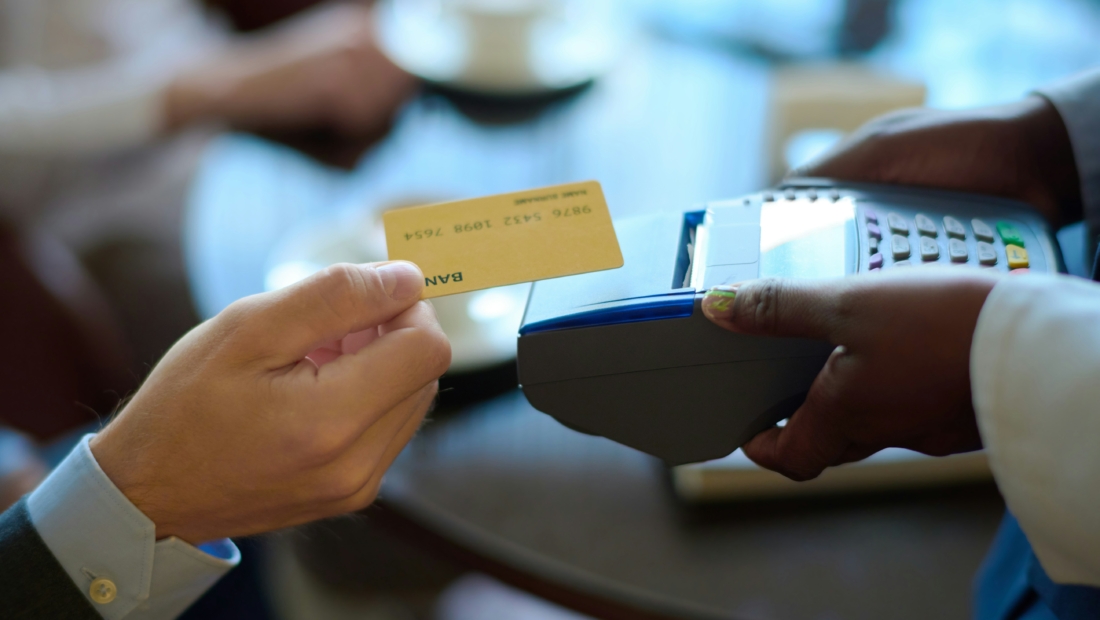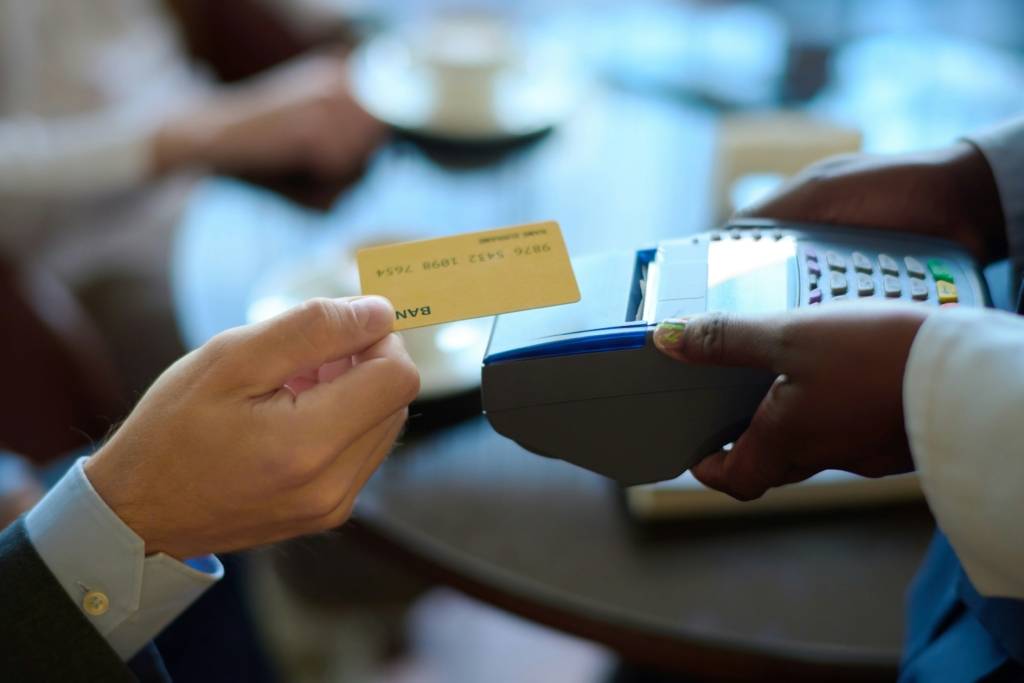How to Get a Business Credit Card

Build strong business credit
with your EIN

Small business owners looking for a way to finance and organize purchases will want to know how to get a business credit card.
In addition to having the application information ready in advance, you’ll want to know how both personal credit and business credit scores are considered for approval.
Business Credit Card Requirements:
Legal Name of the Business and its Contact Information
When filling out a small business credit card application, the first thing they may ask is the business name. If you have filed paperwork for an LLC, S-Corp, or C-Corp, use that name. You may have also created a DBA with your state business office.
Even if you haven’t formally filed any paperwork to create your business name, you likely have a preferred company title. For sole proprietorships (one-person companies), this could also be your first and last name.
Also include your business mailing address or physical address, as well as a professional phone number you can answer during business hours.
Industry Type
The government and banking institutions need to see what type of business you do. While the details aren’t necessary, the industry type is typically required for all banking and loan applications. This could be indicated as a drop-down box or by typing in your industry.
Why do they ask this? Not all loans or credit cards can be used for all industries. The marijuana industry, for example, still has limitations for how it can borrow and spend money, even though the sale and distribution of it have been legalized in some states.
Number of Employees and Years in Business
These questions help a bank determine how established you are as a company. Having more employees usually signifies a larger company and could tell them how many potential employee cards you could request in the future.
Years in business also indicate stability. A new business may not seem as trustworthy as one that’s been operating for a decade or more.
While having been in business for a year or less doesn’t mean you can’t get credit, history is an important factor lenders may use when considering all available info.
Federal Tax ID
The federal tax ID is required for banking and finance rules; it’s also known as the Employee Identification Number (EIN.) Also, note that you don’t have to actually have employees to request an EIN, and it’s free and easy to get from the Federal Government.
This 9-digit number is necessary for all kinds of business documentation, including tax filing, payroll, and borrowing money. If you don’t have one yet, now is the time to act.
(Sole proprietors can continue using their Social Security Number if they choose, but many individual business owners prefer the EIN for security reasons.)
Annual Business Revenue and Expenses
Up until now, most of the information requested on a business credit card application has been simple. Card issuers, however, will also need some hard financial information about you and your company to make sure you are a good risk before extending business credit.
Two financial categories that have significant influence are your annual business revenue and the business expenses you need to keep your company running.
Card issuers will take a look at both to see that you earn enough to pay for common expenses, plus, have extra cash for making minimum card payments. This is usually measured in cash flow reports.
The more business revenue you have, the more likely you will be to have a “yes” answer on your application. It can also get you access to higher credit limits.
Personal Guarantee
The business details are just the start of what a bank wants to see when approving you. They will also need to know that you can personally cover any payments with your own cash funds and assets if needed.
This personal guarantee is common for business credit cards, even if your company revenues and business expenses are the most influential in an application. By personally guaranteeing the credit, you are transferring liability from your company to yourself in a case of non-payment.
This agreement is required by the card issuers that offer most business credit cards today.
Have Good Personal Credit Scores
Business credit cards are rarely given out to those with bad credit. In some rare instances, or for secured credit cards that have fewer rewards points promos and a higher rate, you could get access to credit with a bad credit history.
For the type of cards that are most beneficial, like those that give cashback for eligible purchases and have lower interest rates, you’ll need very good or even excellent personal credit to apply.
Now is a good time to familiarize yourself with your current FICO credit score and see where you rank.
You will also want to look at your full credit report, which can be accessed for free from each of the three credit reporting agencies at least one time a year. If you see anything suspicious, unfamiliar, or incorrect, get this fixed before you apply for your next small business card.
Other ways you can boost your score before applying include paying down high balances on existing personal credit cards, which can create a better credit utilization ratio.
Don’t close out any unused or paid-off cards, as this can also damage your utilization ratio and make your FICO go lower.
Avoid applying for other credit, which can temporarily drop your score. Also, keep making on-time payments to your other accounts, including credit, utility, or medical providers.
Late payments can be counted against you for future credit opportunities, including those business cards with a personal guarantee.
If you have been taking action to improve your score, be patient as the results kick in. You may consider applying for business credit after your efforts have paid off.
Most card issuers want to see a minimum credit score of 640, with the better cards requiring scores in the 700s to get access to higher credit limits, lower interest rates, and no annual fees for cardholders.

Good Business Credit Scores Help Too
Whether you apply for a card that requires your personal credit history, or you find a card that truly takes only your business activity into account, it never hurts to start building your business credit. Perhaps you’re interested in a business card for just this purpose.
It’s helpful to understand how your business credit is established and reported, and some people assume that a business credit card automatically gives them a business credit history.
This isn’t always the case, especially if you’re a sole proprietor using your personal SSN to get credit.
One of the better ways to build business credit is with a service like Credit Strong. When you apply for a loan, the loan proceeds are deposited into a business savings account.
As you make each of the monthly payments, they are reported to business credit agencies, so you establish a business payment history.
This solution not only works to help you build business credit, but it also doesn’t penalize you for paying it off early. As long as the payments you make are on time, you’ll get credit for payments you’ve made. There are no early payoff fines, annual fees, or penalties.
For those who want to get a business credit score started before they apply for a business credit card, this method is worthwhile. It’s even possible for those who are new in business and are likely to be turned down for a traditional business loan by banks or credit unions.
Once you’ve finished your Credit Strong program, you’ll have a well-established business credit presence – the kind that lenders respect and can see themselves doing business with.
It’s one more step in creating the business credit score needed to grow your company, no matter the industry you work in.
Collect the Info that you Need to Apply
Are you ready to apply for the card you want? First, make sure you have compared all of the options available to you. Cards are unique in their benefits, rates, annual fees, and earned rewards for eligible purchases.
If you haven’t already, sit down and figure out how you spend your money each month. If you don’t drive much or travel, a card that earns airline points may not be a good fit.
Know the rewards categories for each option and try for one that balances your spending habits with other perks.
Also, note what makes up eligible purchases. Not all cards give you a way to earn rewards points for everything you buy.
When you’ve selected the perfect card, gather all of the information listed in the first part of this article, including your name, your business name, address, phone number, birthday, cash flow and revenue, business expenses, industry, and EIN or Social Security Number.
You may be asked about the number of employees you have and any other outstanding debts you owe or loans you’ve taken out under your business name.
If you are using your new card for balance transfers, have the information for the cards you want to pay off handy. This may include account numbers and balances.
A credit card company may let you pick reward categories or due dates at the time of application, as well.
Get familiar with when your corporate card statement will come out each month and when the first payment might be due. Remind yourself to review this all again when you get your card in the mail.
Apply for the Business Card and Wait for an Answer
If you’ve found the card you think will help you meet both your business and credit goals, you should apply using the information mentioned above.
Be careful to take your time and read through it fully before filling out the information. Every credit card application may be slightly different.
Once you’ve submitted the application, it’s possible to see right away if you’ve been approved. If not, the card company should let you know that a decision will be coming to you via email, phone, or at the mailing address listed on your application.
In any case, you’ll find out within 2-3 weeks, and approvals should see a card arrive in the mail around that time too.
Any credit rejections will prompt an explanation to be sent to your mailbox on why you didn’t get the approval and possibly more information about your credit score or credit history.
If you signed up for a bonus points promotional offer requiring you to spend a certain amount on eligible purchases within a limited time, mark your calendar.
Use the application date as day one, and be sure to allow extra time for eligible purchases to earn points well before the promotion end date.
Read any accompanying literature or contracts that come with your new card to be sure you understand how much it will cost to use and what benefits it includes. The interest rate or credit limit may be different than what was offered when you originally applied.
Be aware of your personalized card terms. It may include a different annual fee or bonus points promotional offer, as well as hidden charges like foreign transaction fees.
FAQs
How to get a business credit card with bad personal credit?
It can be very difficult to qualify for a business credit card if you don’t have very good or even excellent credit.
That doesn’t mean it’s impossible, however. If you have a lower FICO score, you could qualify for a secured business credit card that requires a security deposit equal to the line of credit you want.
Another option is to get a personal credit card that you can use to make eligible purchases for business and even track business expenses. This is a suitable option for small businesses made up of a single person.
It can also help you build your personal credit score to a point where you may qualify for a business card too.
Bad credit business credit cards are unusual, but they do exist. Just look out for high interest or expensive annual fees, which can cut into your small business budget. These also rarely give you perks like cashback for eligible purchases or promotional offers.
Not all offer employees cards. Cash advances are typically very expensive, too.
How to apply for a business credit card with EIN?
Most business credit cards require you to include either your personal Social Security Number or a business EIN. The Employee Identification Number is a 9-digit identifier used to apply for credit and handle certain financial and tax-related information.
You can get an EIN for free at the IRS website. It only requires some basic information about you and your company.
You’ll also get a number instantly and can begin using it for all of your business tax records, employee payroll documents, and future small business credit card applications.
How to get a business credit card for a startup?
Most startups haven’t been in business very often and won’t have the years of business financial records and cash revenues that are required for most business credit cards. You can still apply for business credit, although your options may be limited.
One solution is a secured business credit card that uses a cash deposit to guarantee your purchases. This isn’t ideal for those needing access to high credit lines and employee cards, or who want to carry a balance from month to month, however.
If you have good credit, you can usually qualify for a small business credit card and a personal guarantee that you’ll repay the balance owed with your own financial means.
Those with very good or excellent credit may also see waived annual fees and lucrative bonus points promotional offers.
How to get a business credit card without using personal credit?
If you don’t want your small business credit card tied to your personal credit score or credit report, you’ll need to have a well-established business credit that you can rely on to qualify.
Then, if you make enough revenue to get access to a credit line, it’s possible to keep the two separate in the future.
Most business credit cards that don’t rely on your personal credit require proof of large revenues and access to liquid cash. Card issuers need to know that your business is healthy and in a position to repay debts.
Credit reports provided by business credit bureaus should show a history of on-time payments, as well.
Be wary of business cards with high annual fees or add-on expenses for things like employee cards. These costs should be disclosed in your card terms and should be reviewed before you apply.
Also, not all cards consider all purchases to be eligible purchases for earning promotions with cash rewards or gift cards.
Know how you can earn cashback or other rewards and what it will take to get the promotional offers advertised with the card.
How to get a business credit card without a business?
If you haven’t started your business yet or don’t have a solid history of cash flow as an entrepreneur, you still may qualify for some business credit cards. You will need to apply with your personal information, such as your Social Security Number, address, and name.
Sole proprietors and single-person business owners often use a business credit card too.
The card is payable by them and reported to their personal credit report and some business credit agencies. You shouldn’t lie to get a business card, but most people can get one with even a small side hustle.
Whether you freelance, sell things on eBay, or simply hope to create a cupcake business someday, the right card for your needs might be a personal credit card, like the Chase Ultimate Reward Card or Spart Cash Card.
You could also be a fit for a corporate credit card that earns points for gift cards with each qualifying purchase. Look for a business or personal card with excellent rewards points, low annual fees, and better interest for those with responsible payment histories.
The better cards will give you a variety of cashback or gift card earning opportunities for a wide range of eligible purchases. Some come with cash bonus offers for making so many eligible purchases in the first few months. These can really help boost your earnings.
CreditStrong for Business is the only 0% interest business credit builder in the nation
